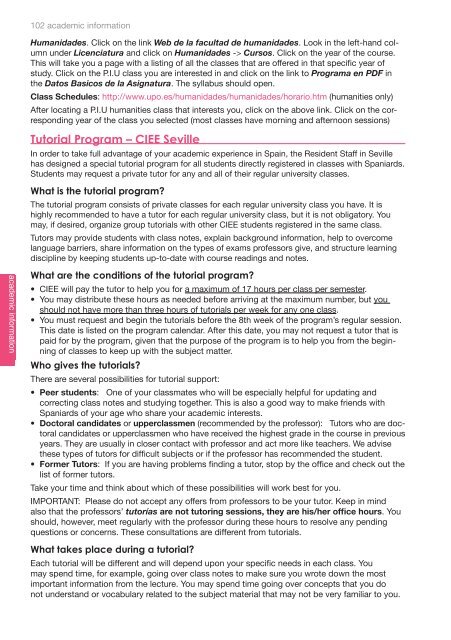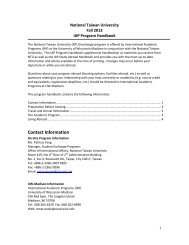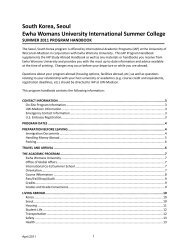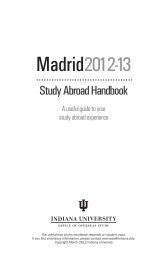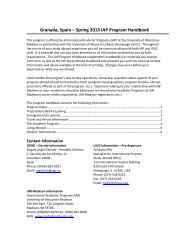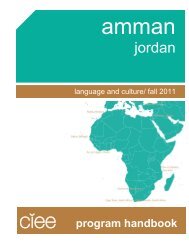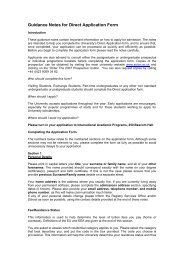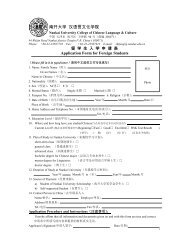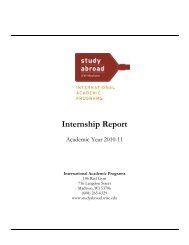teach in spain - UW Study Abroad
teach in spain - UW Study Abroad
teach in spain - UW Study Abroad
You also want an ePaper? Increase the reach of your titles
YUMPU automatically turns print PDFs into web optimized ePapers that Google loves.
102 academic <strong>in</strong>formation<br />
academic <strong>in</strong>formation<br />
Humanidades. Click on the l<strong>in</strong>k Web de la facultad de humanidades. Look <strong>in</strong> the left-hand column<br />
under Licenciatura and click on Humanidades -> Cursos. Click on the year of the course.<br />
This will take you a page with a list<strong>in</strong>g of all the classes that are offered <strong>in</strong> that specific year of<br />
study. Click on the P.I.U class you are <strong>in</strong>terested <strong>in</strong> and click on the l<strong>in</strong>k to Programa en PDF <strong>in</strong><br />
the Datos Basicos de la Asignatura. The syllabus should open.<br />
Class Schedules: http://www.upo.es/humanidades/humanidades/horario.htm (humanities only)<br />
After locat<strong>in</strong>g a P.I.U humanities class that <strong>in</strong>terests you, click on the above l<strong>in</strong>k. Click on the correspond<strong>in</strong>g<br />
year of the class you selected (most classes have morn<strong>in</strong>g and afternoon sessions)<br />
Tutorial Program – CIEE Seville<br />
In order to take full advantage of your academic experience <strong>in</strong> Spa<strong>in</strong>, the Resident Staff <strong>in</strong> Seville<br />
has designed a special tutorial program for all students directly registered <strong>in</strong> classes with Spaniards.<br />
Students may request a private tutor for any and all of their regular university classes.<br />
What is the tutorial program?<br />
The tutorial program consists of private classes for each regular university class you have. It is<br />
highly recommended to have a tutor for each regular university class, but it is not obligatory. You<br />
may, if desired, organize group tutorials with other CIEE students registered <strong>in</strong> the same class.<br />
Tutors may provide students with class notes, expla<strong>in</strong> background <strong>in</strong>formation, help to overcome<br />
language barriers, share <strong>in</strong>formation on the types of exams professors give, and structure learn<strong>in</strong>g<br />
discipl<strong>in</strong>e by keep<strong>in</strong>g students up-to-date with course read<strong>in</strong>gs and notes.<br />
What are the conditions of the tutorial program?<br />
• CIEE will pay the tutor to help you for a maximum of 17 hours per class per semester.<br />
• You may distribute these hours as needed before arriv<strong>in</strong>g at the maximum number, but you<br />
should not have more than three hours of tutorials per week for any one class.<br />
• You must request and beg<strong>in</strong> the tutorials before the 8th week of the program’s regular session.<br />
This date is listed on the program calendar. After this date, you may not request a tutor that is<br />
paid for by the program, given that the purpose of the program is to help you from the beg<strong>in</strong>n<strong>in</strong>g<br />
of classes to keep up with the subject matter.<br />
Who gives the tutorials?<br />
There are several possibilities for tutorial support:<br />
• Peer students: One of your classmates who will be especially helpful for updat<strong>in</strong>g and<br />
correct<strong>in</strong>g class notes and study<strong>in</strong>g together. This is also a good way to make friends with<br />
Spaniards of your age who share your academic <strong>in</strong>terests.<br />
• Doctoral candidates or upperclassmen (recommended by the professor): Tutors who are doctoral<br />
candidates or upperclassmen who have received the highest grade <strong>in</strong> the course <strong>in</strong> previous<br />
years. They are usually <strong>in</strong> closer contact with professor and act more like <strong>teach</strong>ers. We advise<br />
these types of tutors for difficult subjects or if the professor has recommended the student.<br />
• Former Tutors: If you are hav<strong>in</strong>g problems f<strong>in</strong>d<strong>in</strong>g a tutor, stop by the office and check out the<br />
list of former tutors.<br />
Take your time and th<strong>in</strong>k about which of these possibilities will work best for you.<br />
IMPORTANT: Please do not accept any offers from professors to be your tutor. Keep <strong>in</strong> m<strong>in</strong>d<br />
also that the professors’ tutorías are not tutor<strong>in</strong>g sessions, they are his/her office hours. You<br />
should, however, meet regularly with the professor dur<strong>in</strong>g these hours to resolve any pend<strong>in</strong>g<br />
questions or concerns. These consultations are different from tutorials.<br />
What takes place dur<strong>in</strong>g a tutorial?<br />
Each tutorial will be different and will depend upon your specific needs <strong>in</strong> each class. You<br />
may spend time, for example, go<strong>in</strong>g over class notes to make sure you wrote down the most<br />
important <strong>in</strong>formation from the lecture. You may spend time go<strong>in</strong>g over concepts that you do<br />
not understand or vocabulary related to the subject material that may not be very familiar to you.


